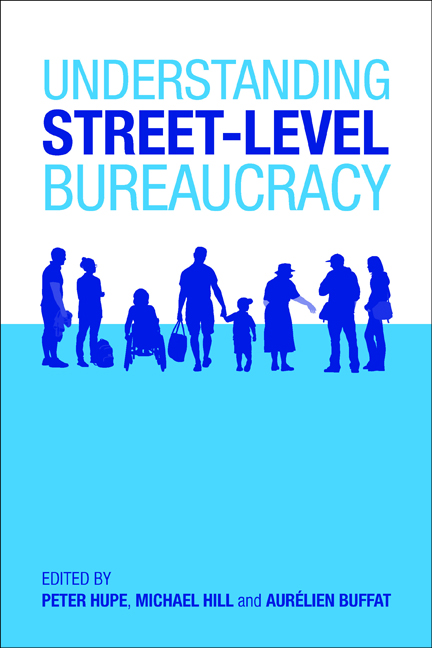Book contents
- Frontmatter
- Contents
- Biographical notes
- Preface
- Part One Introduction
- Part Two Delivering services and benefits: street-level bureaucracy and the welfare state
- Part Three Agents of the state: street-level bureaucracy and law enforcement
- Part Four Embedded in society: street-level bureaucrats as public actors
- Part Five The management of street-level bureaucrats
- Part Six The promise of professionalism
- Part Seven Conclusion
- References
- Index
Eleven - Personalisation and adult social work: recasting professional discretion at the street level?
Published online by Cambridge University Press: 08 March 2022
- Frontmatter
- Contents
- Biographical notes
- Preface
- Part One Introduction
- Part Two Delivering services and benefits: street-level bureaucracy and the welfare state
- Part Three Agents of the state: street-level bureaucracy and law enforcement
- Part Four Embedded in society: street-level bureaucrats as public actors
- Part Five The management of street-level bureaucrats
- Part Six The promise of professionalism
- Part Seven Conclusion
- References
- Index
Summary
Introduction
The author's empirical investigations of adult social care as a site of street-level bureaucracy have been centrally concerned with the distinction drawn in Chapter One between discretion-as-granted and discretion-as-used. These studies of social workers’ assessment practice within English local authority social services departments span two decades, a period marked by policy reform and major shifts in the approach to governing front-line behaviour. Under the National Health Service and Community Care Act (NHSCCA) 1990, social services departments were required to contract out directly provided services to private and third-sector organisations. This transformation of function from provider to purchaser was underpinned by a managerialised system of assessment and care management designed to curtail professional discretion and manage resources in line with strategic priorities. Criticisms of the resource- and service-led practice to emerge served to legitimate subsequent moves towards ‘personalising’ adult social care and a return to more traditional social work roles, values and professional authority.
Three of the author's studies centre on the impact of care management on front-line social work practice; the fourth is a study of direct payments, which represent the origins of personalisation in the allocation of cash budgets for people to purchase their own support. In a meta-analysis of the findings (Ellis, 2011), the author attempts to show that changes in discretion-as-granted attendant on shifts in the mode of governance have consequences for the nature and scope of discretion-as-used. Much of the empirical work is based on direct observation in line with a phenomenological approach to investigating the negotiated order of front-line practice (for overview, see Ellis, 2011). The descriptive detail of the findings is analysed within a broader critical framework that reflects Lipsky's (2010) concern with the multilayered nature of policymaking highlighted in Chapter One. Both policy ambiguity at the macro-level, for example, and the nature of strategic and operational management at the meso-level are shown to affect the scope and type of discretion and the way in which it is used on the front lines of contemporary adult social care. In contradistinction to Lipsky's approach, however, which generalises across a range of settings to provide a homogeneous account of street-level bureaucracy, the author identifies differing patterns of behaviour under specific organisational conditions.
- Type
- Chapter
- Information
- Understanding Street-Level Bureaucracy , pp. 187 - 202Publisher: Bristol University PressPrint publication year: 2015
- 1
- Cited by



